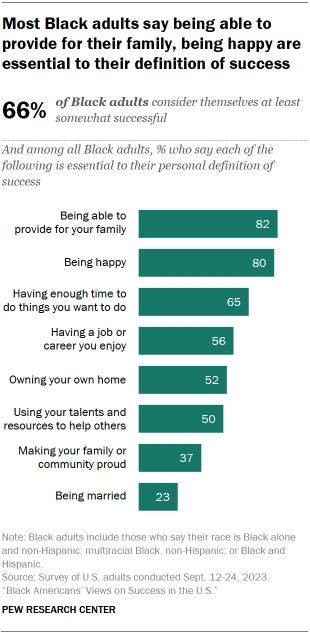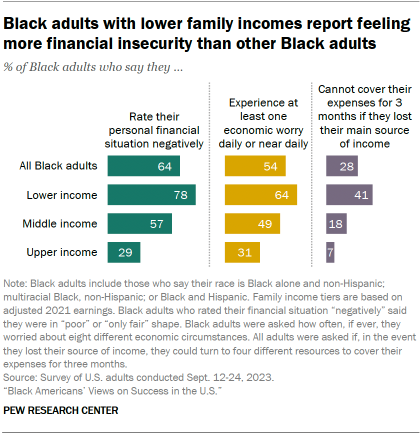Exploring Black adults’ perspectives on personal and financial success, and the challenges they encounter in pursuing their aspirations
Pew Research Center conducted a study focusing on Black Americans’ perspectives regarding personal and financial success in the United States, as well as their evaluations of their current financial status.
A survey was carried out involving 4,736 U.S. adults who self-identify as Black and non-Hispanic, multiracial Black and non-Hispanic, or Black and Hispanic. The survey took place from Sept. 12 to Sept. 24, 2023, and included 1,755 Black adults on the Center’s American Trends Panel (ATP) and 2,981 Black adults on Ipsos’ KnowledgePanel.
Individuals on both panels were selected through national random sampling of residential addresses. The recruitment of panelists by mail ensures a comprehensive representation of nearly all U.S. Black adults. This approach instills confidence that any sample can accurately reflect the entire population. For more details on this survey, consult the methodology and questionnaire.
The terms Black Americans and Black adults are used interchangeably in this report, referring to U.S. adults who self-identify as Black, either solely or in conjunction with other races or Hispanic ethnicity.
Throughout this report, Black, non-Hispanic respondents are individuals who identify as Black only and state they have no Hispanic heritage. Black Hispanic respondents are those who identify as Black and declare Hispanic heritage. Multiracial respondents are individuals who indicate two or more racial backgrounds (including Black) and state they are not Hispanic.
In this context, immigrant pertains to individuals who were not U.S. citizens from birth – in other words, those born outside the U.S., Puerto Rico, or other U.S. territories to non-U.S. citizen parents.
To establish the upper, middle, and lower-income brackets, respondents’ 2021 family incomes were adjusted to account for variances in purchasing power based on geographical region and household size. Subsequently, respondents were categorized into income groups: Middle income is defined as two-thirds to double the median annual income for the entire surveyed sample. Lower income falls below that range, and upper income lies above it.
Throughout this report, Black adults with upper incomes have family incomes in the upper-income bracket, while Black adults with middle incomes and Black adults with lower incomes possess family incomes in the middle- and lower-income brackets, respectively. Refer to the methodology for a detailed explanation of how the income categories were determined.
A significant majority of Black Americans view themselves as at least somewhat successful (66%). When asked to articulate their personal definition of success, 82% of Black adults emphasize the ability to provide for their families.
Understanding Black Americans’ Definition of Success and Financial Pressures

Success for Black adults goes beyond finances as per a recent Pew Research Center study. They value aspects like personal happiness (80%), having time for personal pursuits (65%), and enjoying their job (56%). Most Black adults report feeling somewhat happy and having enough personal time.
Moreover, about half of Black adults view owning a home (52%) and offering help using their skills (50%) as integral to success. Yet, these metrics also present significant sources of stress.
Financial concerns are a key stressor for Black adults, with 71% feeling pressure to manage personal finances and 68% striving to support their families financially.
- Financial pressure exists across income groups:
- 73% of those with lower incomes
- 70% with middle incomes
- 69% with higher incomes feel the pressure to maintain a certain lifestyle.
- Regarding family financial support:
- 70% of lower-income earners
- 68% of middle-income earners
- 64% of higher-income earners sense the need to provide for their families.
- The desire to own a home also varies:
- 53% of lower-income earners
- 48% of middle-income earners
- 50% of higher-income earners feel the pressure of homeownership.

While financial strains are widespread among Black adults, those with lower incomes face more financial uncertainty. 78% of lower-income Black adults rate their financial situation negatively compared to 57% and 29% for middle and upper-income individuals, respectively.
Moreover, lower-income Black adults are more likely to experience daily financial concerns (64% vs. 49% and 31%) and are less prepared for income loss, with 41% unable to cover three months’ expenses using various financial means.
Black Americans’ Assessment of their Current Financial Situation
In contrast to the improving national economic landscape in 2023, Black Americans express pessimism about their financial well-being. A significant 64% rate their personal financial situation negatively.
Moreover, many Black adults lack financial preparedness in case of sudden income loss. Only 45% believe they can cover expenses for three months using personal savings, and 28% have no means to cover expenses using any financial resource.
A significant number of Black adults face financial worries almost daily
- Approximately 31% are concerned about paying bills, 29% about their debt levels, and 28% about saving enough for retirement on a daily or near-daily basis.
- 24% worry about buying enough food for themselves and their families every day or close to every day.
- 54% have at least one financial concern that troubles them daily or almost daily, such as bill payments, debt, retirement savings, and food affordability.
According to the Census Bureau, Black households in the United States had the lowest median income of all racial and ethnic groups in 2022, at $52,860. Although Black household wealth saw some growth during the pandemic, it still lags significantly behind other racial or ethnic groups. Notably, 24% of single-race, non-Hispanic Black households had minimal or negative wealth as of December 2021, despite improvements during the pandemic.
Prior Pew Research Center reports have indicated that Black Americans tend to experience higher levels of economic uncertainty than other demographics, express growing dissatisfaction with capitalism, and feel that the U.S. economic system treats Black individuals unfairly. Nevertheless, Black adults maintain optimism regarding their financial futures.
Understanding Financial Success for Black Americans
Irrespective of their financial circumstances, Black Americans interpret financial success in various ways. Among Black adults:
- Around 67% consider being debt-free and having enough funds to pursue desired activities crucial to their definition of financial success.
- Approximately 49% share the same sentiment about homeownership.
- Less than half prioritize being able to pass on financial assets to future generations (44%), having multiple income sources (43%), early retirement (35%), or business ownership (22%) in their perception of financial success.
This study surveyed 4,736 Black adults in the U.S. between September 12 and 24, 2023, in English and Spanish to ascertain their views on personal and financial success in America, as well as the economic hardships they face.
The upcoming sections delve into:
How Black Americans define personal success
How Black Americans perceive financial success and their encountered financial hurdles




